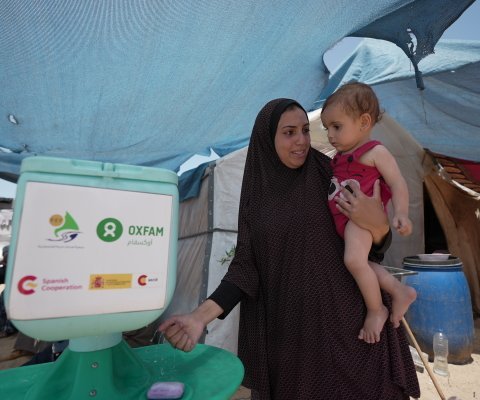Sweden tops the ranking, US flails at 23, Nigeria last
Governments are simply not doing what they could be doing to tackle inequality, according to a new global index published by Oxfam and Development Finance International today.
The ‘Commitment to Reducing Inequality Index’ ranks 152 governments on their policies in three areas critical to reducing the gap between rich and poor, including social spending, taxation policies, and labor rights.
“While many leaders pay lip-service to the dangers of extreme inequality and the urgency to tackle it, this index shows that not one government is doing enough,” said Paul O’Brien, Vice-President of Policy and Advocacy at Oxfam America. “This is most certainly true here in the United States, where President Trump campaigned against what he called a ‘rigged system’ that favors the rich, but is now delivering the opposite."
The index ranks countries based on the latest available data from governments and global institutions such as the World Bank on the following:
- Social spending: The quantity and quality of government spending on public services like healthcare, education, and social protection such as the provision of income support.
- Taxation: The extent to which governments collect taxes fairly, and redistribute wealth and opportunity across society through taxes on the wealthiest individuals and companies.
- Labor rights: The degree to which governments support workers’ rights, and particularly the rights of women in the workplace, through enforcing a minimum wage, equal pay, and paid parental leave; supporting the rights of trade unions; and providing protection against discrimination.
“Tackling inequality is about political will. Across the globeordinary people are suffering the consequences of political failure in the form of underfunded schools, inadequate tax collection, and low paid insecure jobs,” said Matthew Martin, Director of Development Finance International.
Some key findings of the index include:
- Sweden, Belgium and Denmark top the indexbecause of high levels of social spending and good protections for workers, yet even these countries could still do much more.
- Nigeria, Bahrain and Myanmar come bottom because of exceptionally low levels of government spending on health, education and social protection; an extremely bad record on labor and women’s rights; and, particularly in the case of Bahrain and Nigeria, a tax system that overburdens the poorest in society and fails to tax its wealthiest citizens. Despite its booming economy, poverty is increasing in Nigeria: 1 in 10 children do not reach their first birthday; and over 10 million do not go to school.
- The United States ranks as one of the worst performing rich country at number 23 on the index, behind countries like France, Australia, Canada, and the UK. Worse yet, President Trump and the GOP’s proposals to slash taxes for wealthy individuals and large multinational corporations and strip health insurance from millions of the poorest Americans are likely to make things worse.
- Many poor countries outperform wealthier countries. One in four of the top 50 countries are low or middle income countries - proving that tackling inequality is about political will and not just economic might. For example, Namibia is in 40th place above many wealthier countries, because of high levels of social spending and some of the world’s most progressive tax policies.
- Several countries, particularly in the Middle East, are not included in the index because a lack of publicly available data makes it impossible to assess their performance.
Oxfam and Development Finance International also estimated that President Trumps proposed policies on tax reform, social spending and labor rights could see the US slide 6 places down the global rankings – putting it below countries like Greece and Spain. The Administrations tax proposals will see the US’s tax ranking slide 33 places down the world tax rankings. President Trump’s proposed budget will dramatically slash spending on health care, education and social protection. Around 40 percent of the proposed tax cuts would benefit the top 1 percent richest Americans and the corporate rate would fall from one of the highest among rich countries to one of the lowest. The Administration also opposes an increase of the minimum wage.
The index will be updated annually, and this first edition has been launched as a ‘work in progress’ to encourage input, comment and debate. Subsequent versions will be refined to provide the best possible assessment of a government’s policy on inequality over time.
“We all know inequality is has reached crisis levels. Our hope with this index is to build a public conversation about how to tackle this crisis. Governments need to build fairer tax systems, uphold the rights of workers, and invest more money in our public services, here at home and around the world,” continued O’Brien. “It’s time to make our economies work for all of us, not just a few.”





